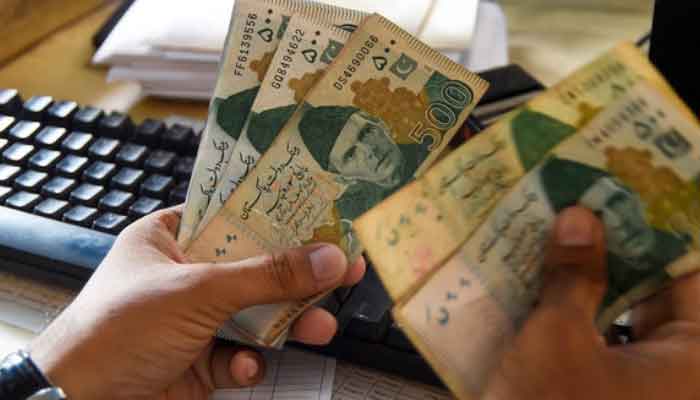- Local unit falls Rs8.71 against dollar in interbank market.
- Dollar bonds due 2031 fall to lowest since November.
- New rate is just Re1 away from much-awaited rate of Rs300.
KARACHI: The rupee slumped to a record low of 298.93 amid political tumult in the wake of clashes that broke out in the country following the arrests of senior leaders of the Pakistan Tehreek-e-Insaf (PTI)
The local unit fell Rs8.71, or 3%, against the dollar on Thursday closing at 298.93 in the interbank market, data released by the State Bank of Pakistan (SBP) showed.
It should be noted that the dollar bonds due 2031 fell to the lowest since November on Thursday and were indicated at 33.10 cents on the dollar.
The new rate is just Re1 away from the much-anticipated rate of Rs300 per dollar.
The rupee depreciation has piled up foreign debt without taking new external loans, making imports further expensive for Pakistan, which faced a six-decade high inflation reading at 36.4% in April 2023.
Financial pundits believe that the rupee has been depreciating due to political and social unrest caused after the arrest of PTI Chairman Imran Khan.
Moreover, the dollar demand supply gap has also widened as the exporters have stopped selling US currency on speculations that rupee would depreciated further versus the greenback. On the other hand, importers are seen rushing to buy dollars.
This gap in the demand and supply of the foreign currency in the interbank market have contributed to the rupee’s devaluation.
Political situation would improve in a day or two and help the currency stabilise around the current levels or partially recover ground against the greenback.
“Pressure had built up after a few months of stability,” Saleem Amjad, chief executive officer at Link International Exchange Company, told Bloomberg.
“Sentiment turned sour given the political turmoil, the prospect of another delay in the IMF loan and a drop in remittances.”
Dr Khaqan Najeeb, former finance ministry adviser, said that continuing political instability has taken a toll on market sentiment pushing the Pakistani rupee to hit a record low.
“The heightened political turmoil has come at a time when the economy has been in the doldrums for months largely due to an acute balance of payment crisis, with falling State Bank of Pakistan reserves barely covering a month of highly controlled imports,” he commented a day earlier.
Resilient stocks gain on IMF clarity
On the other hand, the Pakistan Stock Exchange (PSX) held ground as investors remained surefooted in view of the clarity provided by the International Monetary Fund (IMF).
The benchmark KSE-100 was trading at 41,224.31 point at 2:09pm — up by 149.36 points (or 0.36%) despite the economic uncertainties and rupee plunge.
Earlier in the day, the index gained 1%, the most since April 20, immediately after IMF assured that it remains engaged with Pakistan for its loan programme.
“This upside can be short-lived since the political situation remains bleak”, Adnan Khan, head of international sales at Intermarket Securities, told Bloomberg.
The IMF spokesperson has said that the Fund remains engaged with Pakistan on securing funding and policy assurances with the goal of reaching an agreement on the ninth review of the $6.7 billion loan agreed in 2019.
“The IMF sees no indication that Pakistan wants to pause negotiations on disbursement from the current programme,” the spokesperson said addressing concerns that the current political situation would create more hurdles in the revival of the bailout programme.

 Latest News3 days ago
Latest News3 days ago
 Latest News3 days ago
Latest News3 days ago
 Entertainment3 days ago
Entertainment3 days ago
 Latest News3 days ago
Latest News3 days ago
 Latest News3 days ago
Latest News3 days ago
 Latest News3 days ago
Latest News3 days ago
 Latest News3 days ago
Latest News3 days ago
 Latest News3 days ago
Latest News3 days ago

























